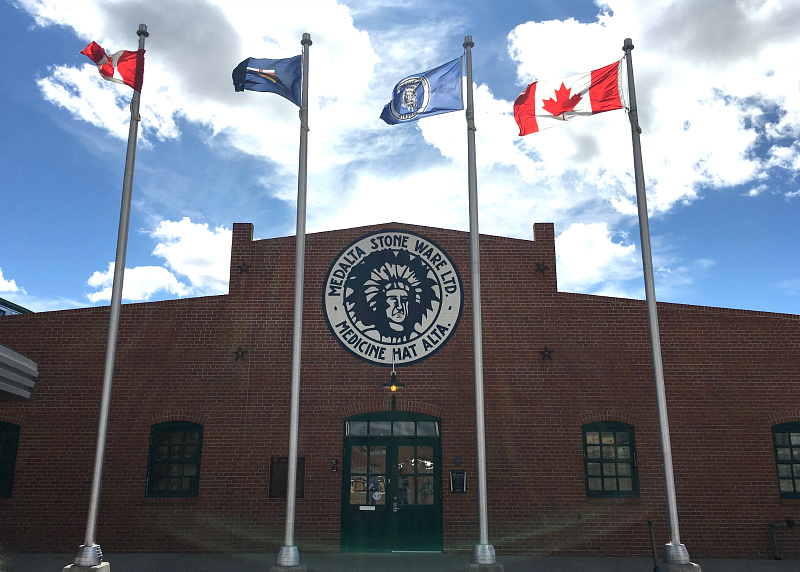
Standing inside the cool, spacious and dimly lit brick-walled beehive kiln at Medalta Potteries, watching my seven year old daughter crane her neck to see to the top of the curved ceiling, it’s hard to imagine the same space crammed from floor to ceiling and wall to wall with hundreds to thousands of clay objects stacked in layers and baking in intensely hot temperatures.
But this dome-shaped kiln and several others like it – along with the tunnel kiln that was put into use at Medalta after World War II – did, in fact, bring into being millions of pieces of ceramics between 1916 and 1954. In a pre-plastics world, ceramics were indispensable to daily life and, during this time, factories in Medicine Hat dominated the Western Canadian clay products market – at times producing more than half of all the clay products made in Canada.
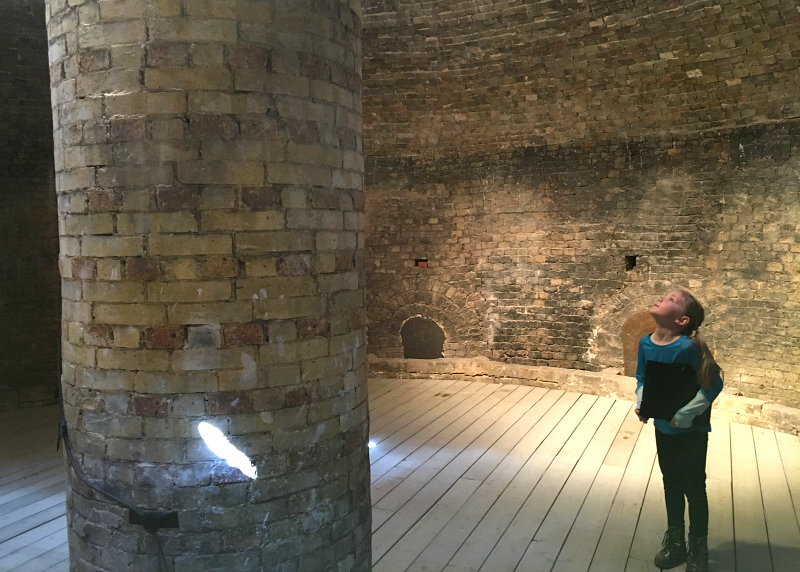
Looking up, up, up… inside the mortarless brick beehive kiln. Such kilns are relatively rare in North America.
The Historic Clay District in Medicine Hat – a smallish city located in the southeast corner of Alberta, about 2 1/2 hours from Calgary – is situated adjacent to the railway tracks; it was the proximity of this railway, together with local natural clay beds along the South Saskatchewan River and abundant, inexpensive natural gas from local gas beds (suitable for firing the kilns with consistent high heat), that allowed Medicine Hat to rise to prominence as a clay products producer. As former home to a number of different companies producing everything from stoneware to fine china to sewer pipes, bricks and toilets, this historic district is 150 acres of fascinating industrial detritus. The site is anchored by the museum, which is housed within the old factory of Medalta Stoneware Ltd.
My husband grew up in The Hat (as it is affectionately known to locals) and his mum, Jane MacKay, is a ceramic artist and a long-time volunteer at Medalta. And yet, due to scheduling conflicts and general laziness (mostly brought on by overeating during holiday visits)… Easter 2017 marked our family’s first visit to Medalta. And it turns out that I had no idea. I had no idea Medalta is so big, so professionally presented and so fascinating!
Under the expert guidance of my mother-in-law, we toured the massive facility and learned more than we thought possible about ceramics, and how, where and why they were produced during Medicine Hat’s clay heyday. Even more interestingly, we learned about the people who worked there… and some who didn’t. For example, we discovered that during the Great Depression of the 1930’s, homeless folks who rode the rails were allowed to sleep in the kilns (when not in use of course!) to escape the prairie’s harsh winter nights, provided they vacated the premises before the morning shift started work. And also that – earlier than they were welcomed in many industries – women held some choice positions in the factories, because their smaller hands and nimble fingers made them excellent at finicky work like attaching mug handles.
We discovered that some very famous pottery lines were produced at Medalta. For example, if you were lucky enough to experience white glove service on the Canadian National or Canadian Pacific railways ‘back in the day’, you would have enjoyed your meals on tableware produced at Medalta. Same story if you were dining at one of the iconic Canadian Pacific hotels. Many of the products that Medalta created over the years can be viewed, particularly as part of the Tony Schlater Collection. This enormous ceramics collection, including only Medalta-produced items, was amassed over the course of five decades by the Alberta farmer and rancher. Some of the pieces are beautiful, some iconic, some crassly commercial and a few are downright quirky. Medalta went through many product evolutions over the years, trying to keep up with changing market demand.
Because a picture is worth a thousand words, come along on a quick photographic tour of the site…
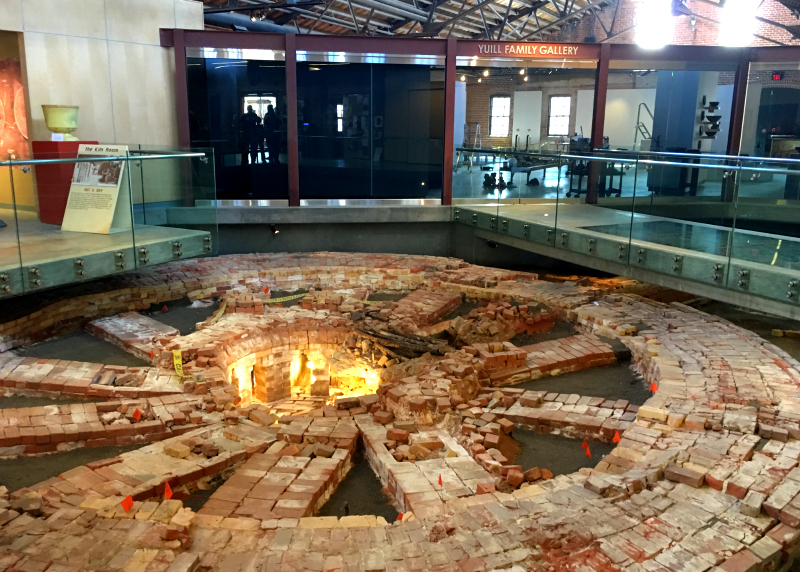
The remnants of this kiln, which greets you at the entrance to Medalta Potteries, were excavated in 2010 from beneath a concrete floor that was laid in the 1960’s.
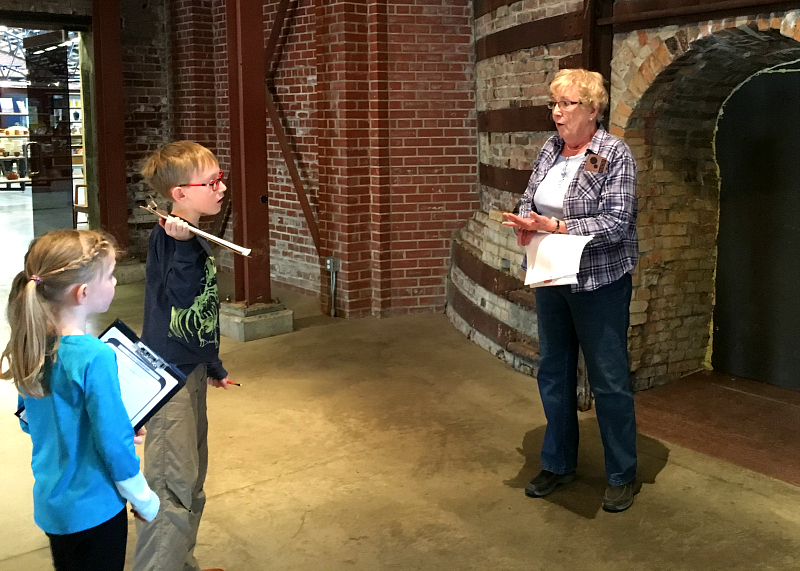
When your Nana is your tour guide, you’d better pay attention! Kids can pick up a scavenger hunt at the front desk.
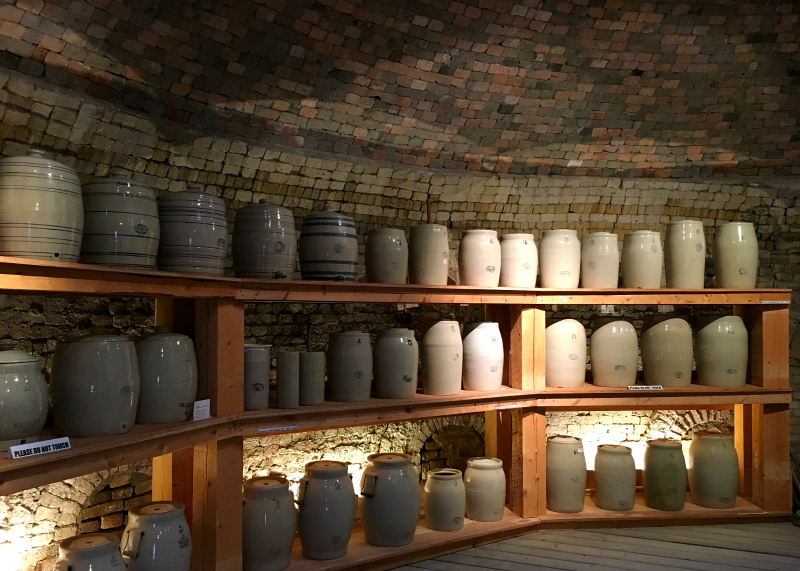
Collection of Medalta butter churns, crocks and water coolers on display inside the beehive kiln.
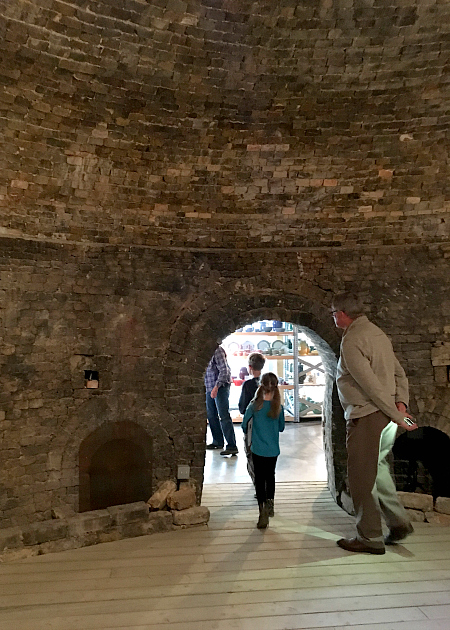
Exiting the kiln through the only door; it would be entirely bricked up by masons prior to each firing. The smaller archways are where the gas-fired flames would burn.
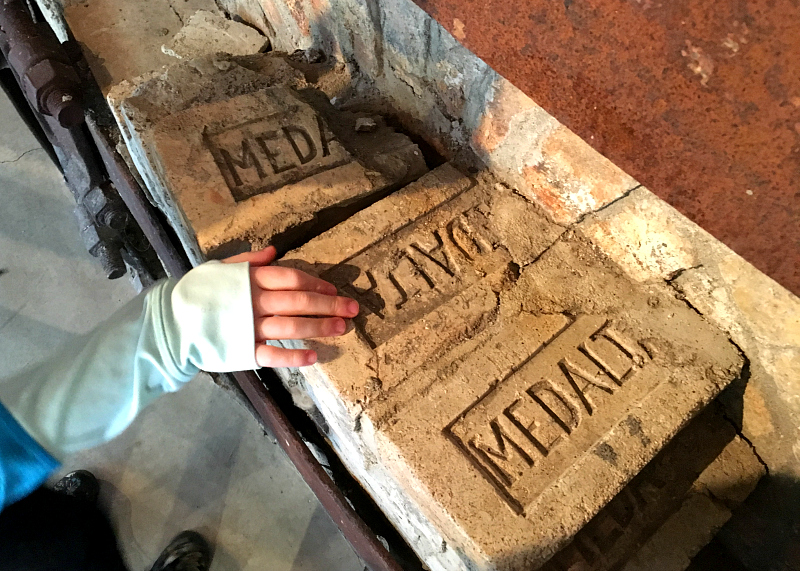
Hands on with Alberta history. The kilns were made using locally produced bricks.
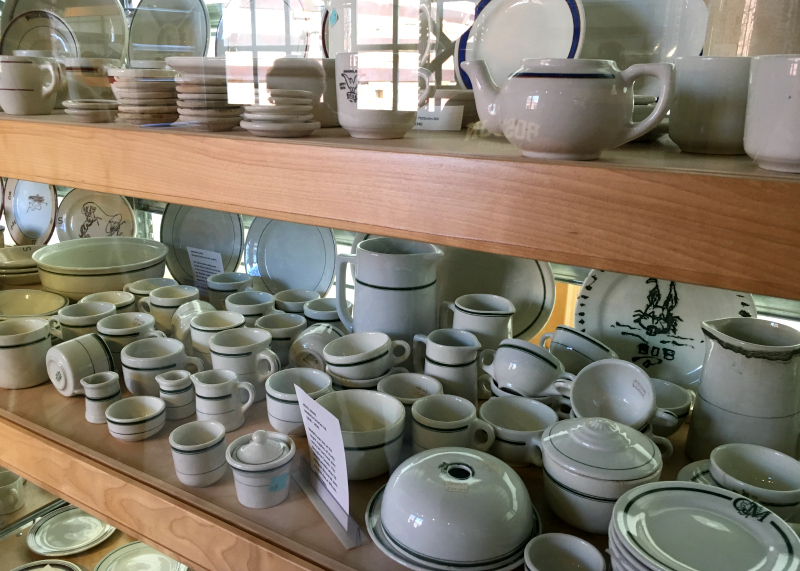
One of the many tableware lines produced at Medalta over the years and now on display in the museum. While excellent for bricks, the local clay was found to be unsuitable for producing pottery; higher quality clay was imported by rail from Saskatchewan.
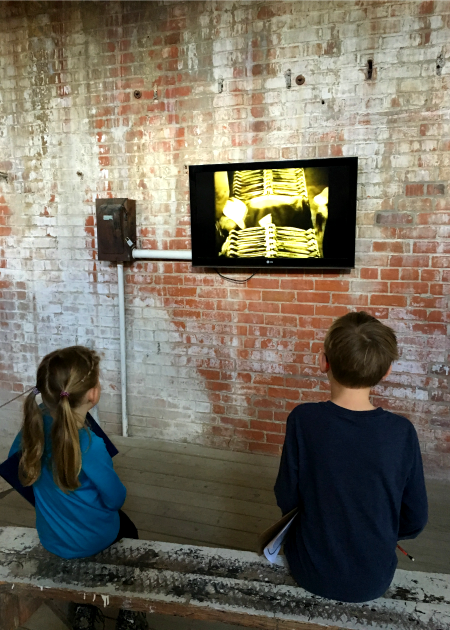
Old film footage shows how the factory produced highly functional pieces for home and industry, starting with goopy natural clay. Hint: there were a lot of steps!
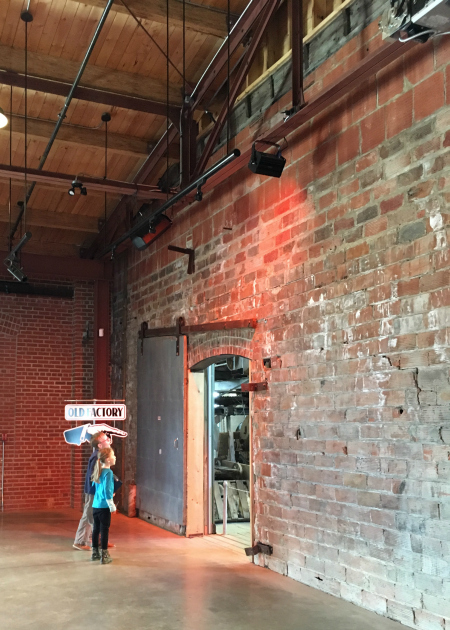
Heading into the Old Factory to see where the messy stuff happened.
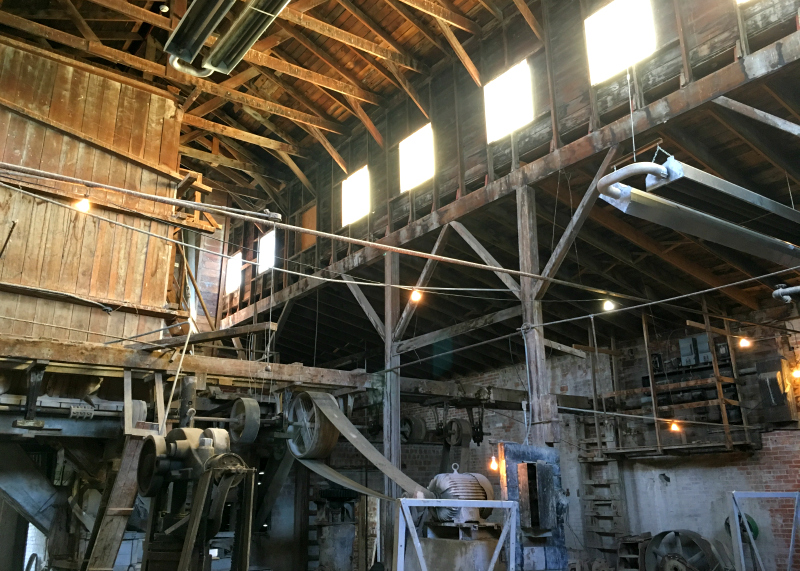
The Old Factory has for the most part been left just as it was when work ceased at Medalta, which is far more interesting than a cleaned up, sanitized version would have been. The functions of some of the contraptions are obvious; others require some imagination!
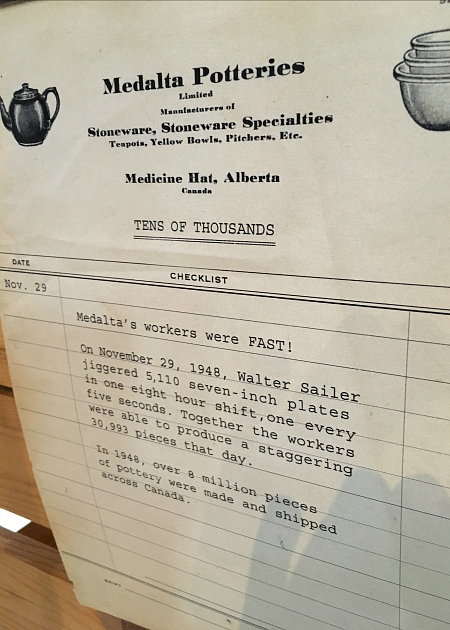
The sheer quantity of product produced in a single shift, single day and single year is mind-boggling.
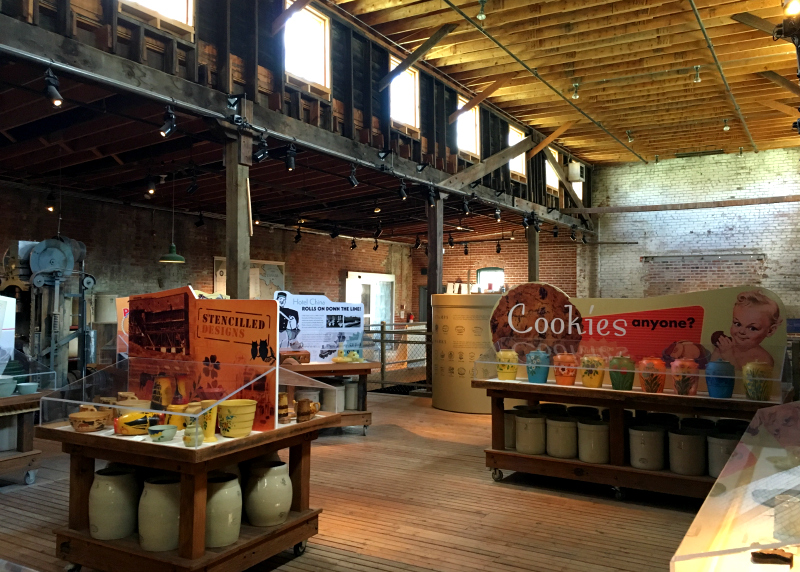
Before plastics stole some of their thunder, ceramics had innumerable home and industrial uses, as described by these displays in Medalta’s Turning Room. This is where the factory’s eponymous and collectable stoneware crocks were pressed into shape – you can see the equipment used to make the crocks in the back left corner of the photo.
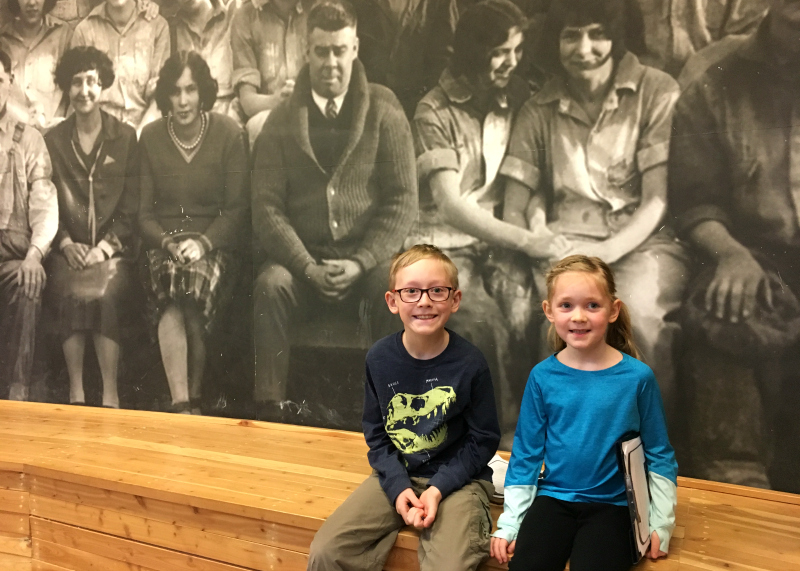
Understanding our history: enlarged images and exhibits throughout the museum do a great job of bringing the life and times of former Albertans to life for current generations.
Far from being a static museum that simply exhibits relics of the past, Medalta is now also an active studio and workshop complex, providing creative space for resident ceramics artists, educational programs for the public and gallery space for local artists and traveling exhibitions. Depending on the day, you may see artists at work or have the opportunity to sign up for hands-on program – I’d recommend checking Medalta’s Events Calendar in advance to see what’s on when you plan to visit. Going to be in Medicine Hat on a Thursday? Don’t miss Medalta’s weekly (year-round) farmers and artists market. There’s no charge to get in and the market features vendors, live music, a cash bar and lots of ready to eat food you buy to eat your supper on site! Want to get your hands on some Medalta crockery? The gift shop sells replica ware handmade by ceramic artists using some of the original equipment still housed in the museum.
The next time you’re in the Medicine Hat area (or you could pretty easily make a day trip of it from Calgary), swing by Medalta Potteries for a glimpse into the ingenuity, creativity and sweat equity that went into making Medicine Hat a Canadian industrial hub. And if you happen to run into my kids’ Nana, say “Hi!” from us!
Beginning June 29th, Medalta hosts I Am Western. This exhibit has “seven hand picked artists presenting their unique interpretations of the cowboy and western genre, deconstructing, re-contextualizing, and modernizing the image of who we are with an eye and integrity to current realities”. I Am Western will be at Medalta through September 30th, 2017.




